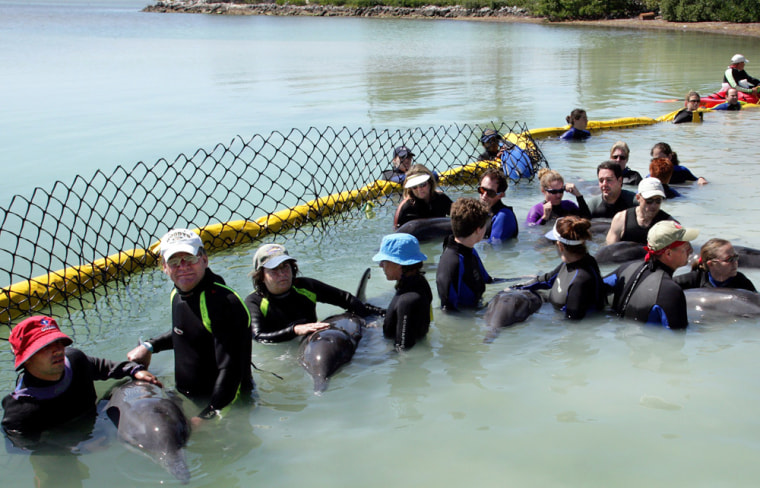Volunteers on Monday continued efforts to save dozens of deep-ocean dolphins that stranded themselves last week, force feeding and rehydrating the marine mammals while experts investigated whether a submarine's sonar was to blame.
Twenty of the 70 or so rough-toothed dolphins have died since the stranding Wednesday off Marathon, Fla., while the rest have been dispersed to areas like a University of Miami facility in Key Biscayne.
Over the weekend, two female dolphins gave birth, but one calf was stillborn while the other later died, NBC affiliate WTVJ of Miami reported.
Submarine was nearby
A day before the dolphins swam ashore, the USS Philadelphia had conducted exercises off Key West, about 45 miles from Marathon. Rough-toothed dolphins are a species that lives in deep waters and is rarely seen near shore.
Navy officials refused to say if the submarine used its sonar during the exercise.
Some scientists surmise that loud bursts of sonar, which can be heard for miles in the water, may disorient or scare marine mammals, causing them to surface too quickly and suffer the equivalent of what divers know as the bends — when sudden decompression forms nitrogen bubbles in tissue.
“This is absolutely high priority,” said Lt. Cdr. Jensin Sommer, spokeswoman for Norfolk, Va.-based Naval Submarine Forces. “We are looking into this. We want to be good stewards of the environment, and any time there are strandings of marine mammals, we look into the operations and locations of any ships that might have been operating in that area.”
Some euthanized
Experts are conducting necropsies on the dead dolphins, looking for signs of trauma that could have been inflicted by loud noises.
Several dolphins were euthanized after blood tests showed 13 of them were “not likely to recover at all and that they are suffering,” said Laura Engleby, a biologist with the National Marine Fisheries Service.
“Some were still not swimming on their own, and they couldn’t hold themselves up,” Denise Jackson of the Marine Mammal Rescue Team said.
The remaining 31 live dolphins were being given Pedialyte — a drink normally given to dehydrated human babies — and fresh water, Jackson said.
